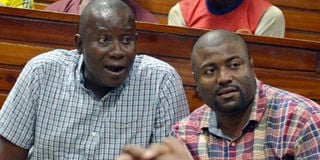How state lost Sh570m ivory smuggling case

Sheikh Mahmoud Abdulrahman (left) and Mahmoud Abdulrahman Sheikh, suspects in the ivory smuggling case, when they appeared in court on June 4, 2015. KEVIN ODIT |
The failed mutual legal assistance between Kenya and Thailand and gaps in evidence adduced in court dealt a blow to the Sh570 million ivory smuggling case.
Chief Magistrate Martha Mutuku acquitted nine accused persons in the case, saying the evidence the prosecution unsuccessfully tried to obtain from Thailand was key in implicating them.
The nine accused persons, among them a Kenya Revenue Authority employee, a businessman and his two sons, were accused of trafficking 511 pieces of elephant tusks to Thailand and Singapore in 2015.
The magistrate ruled that the evidence adduced in the case failed to meet the legal threshold to nail the accused persons.
In addition, Ms Mutuku noted that the prosecution failed to discharge the burden of proof as none of the witnesses gave sufficient evidence to implicate the accused persons.
“Suspicion alone cannot form a basis for a conviction, no matter how strong. The upshot is that the accused persons have no case to answer and may not, therefore, be called upon to defend themselves as regards to all the three counts they have been charged with. I therefore proceed to acquit them under Section 210 of the Criminal Procedure Code,” read Ms Mutuku.
The magistrate observed that the prosecution’s case had glaring gaps, which gave accused persons the benefit of the doubt as provided for in the law.
For instance, the magistrate noted, all the prosecution witnesses who inspected and sealed the container told the court that it had not been tampered with by the time the container was loaded and sealed.
“Then what connects the nine accused persons to the said crimes? It cannot just be the house in which the prosecution failed to call the eyewitness that supposedly saw the truck parked at the said residential house. Did any of the witnesses see the accused persons or find them in possession of the said wildlife trophies? None of the prosecution witnesses confirmed this,” said the magistrate.
According to the magistrate, these gaps raise doubts in the prosecution's case and it was not the responsibility of the accused persons to plug the glaring gaps.
“The evidence tendered must be convincing and leave no doubt on the guilt of the accused. The circumstances of this case have a missing link to the accused persons,” said the magistrate.
The prosecution had stated that it failed to adduce crucial evidence as a result of an unsuccessful mutual legal assistance that the state had requested from the government of Thailand.
Court records show that the Thai government had declined to return to Kenya the ivory with the seized container.
Businessman Abdulrahman Mahmoud and his two sons Sheikh Mohammed and Mahamoud Abdulrahman were charged with three counts of trafficking wildlife trophies to Thailand and Singapore.
Other accused persons were Kenya Revenue Authority employee Lucy Kahoto, Jacob Lithare, Samuel Mundia, Salim Mohammed Juma and Abbasi Issa Rashid.





